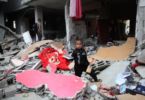Recently, verbal exchange of bullets and bombs and ruthless use of spears and bows have been at the peak between UN high-ups and interim Afghan authorities over the issue of human and women rights in clerics-ruled Afghanistan. Historically, the UN officials had been highlighting curbs imposed by the Taliban rulers on girls’ education, and women’s employment in certain sectors including media, NGOs and other offices where women work jointly with their male colleagues along with restricting women’s travel without a male escort.
Previously, the UN special rapporteur for Afghanistan, Richard Bennett leashed out on Afghan authorities at the UN Human Rights Council and called the Taliban to reverse their draconian, misogynist policies and allow women to work and run businesses, including delivering essential services through NGOs and the UN. The UN Secretary-General Antonio Guterres has recently informed the media that the rights of women and girls in Afghanistan are central to all concerns and will be one of the issues that will be very much on the agenda of the annual UN General Assembly Summit scheduled later in the current month. This shows that women’s rights issues in Afghanistan will not only be discussed during the week-long session but analysts fear some kind of penalties likely to be imposed on Kabul to mould its stance regarding civil liberties in the country.
Meanwhile, the Islamic Emirate is quite determined about its policies which attracted global criticism and prompted an outcry from Afghan women and girls whose quest for higher education and flourishing businesses collapsed to the ground. The IEA was of the view that women’s rights are ensured in Afghanistan within the framework of Islamic principles and the world must respect Islamic values and not interfere in the domestic affairs of Afghanistan. The interim authorities termed it a political issue instead of human rights or civil liberties. Unfortunately, the people of Afghanistan had been caught between the rivalry and antagonism of the Western bloc and interim rulers, as both sides intended to transform the Afghan nation into two conflicting ideologies. The United States and its allies invested billions of dollars in social development, education, and women empowerment during the two decades-long occupation of Afghanistan. Although the US government made concerted efforts to preserve those gains through the Doha agreement, yet all had been reversed over the past two years in Taliban-ruled Afghanistan.
The current day Afghanistan is marred with acute challenges relating to the economy, foreign relations, social development and national security, which merits prudent and kinetic policies by the Afghan interim authorities to steer their nation toward political and economic stability, pause in diplomatic isolation and inclusion into the global community, that will not only prosper Afghan nation but ultimately lead to the consolidation of the Islamic regime in that country. The politically motivated policies of the Taliban rulers proved to be dual-edge weapons for the Emirate both domestically as well as globally. The economic conditions became worse for poor masses due to a reduction in foreign aid while the government’s ban rendered nearly 60 thousand working women jobless, which directly affected an equal number of households in the country. On the global front, the Afghan interim regime could not get a single formal recognition from the global community, instead, it lost the confidence and sympathies of several friendly nations in the past two years.
In fact, the policy of isolation and disengagement had been proved to be counterproductive not for Afghanistan but for the rest of the world as it pushed the South Asian nation toward anarchy and terror regrouping in globally abandoned Afghanistan. It is high time that the global community and Afghan interim authority end their antagonism and engage with each other in a constructive manner that revives peace and stability in a war-torn nation and resolves the unceasing economic woes of common Afghans.







